英语人教版七年级下册UNIT12 sectionB导学案
- 格式:docx
- 大小:12.94 KB
- 文档页数:2
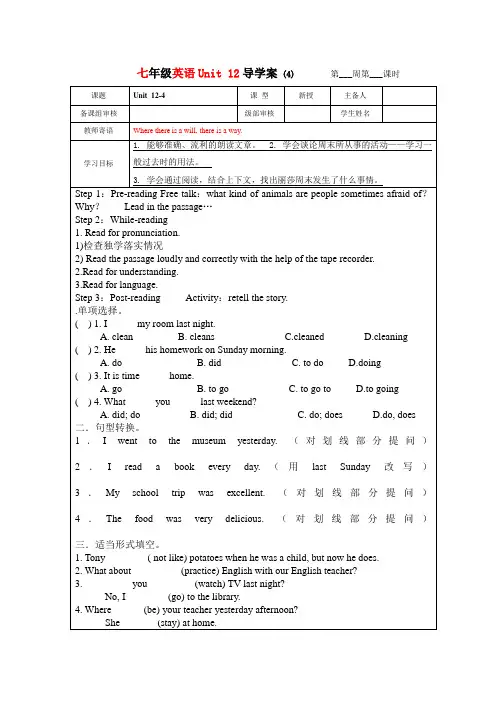
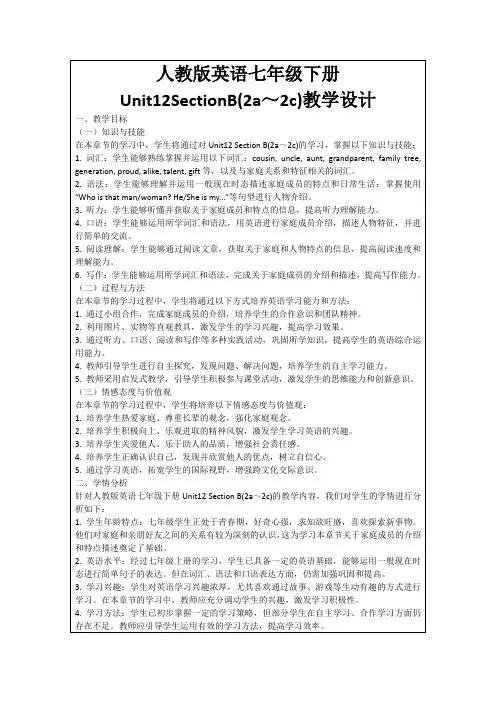
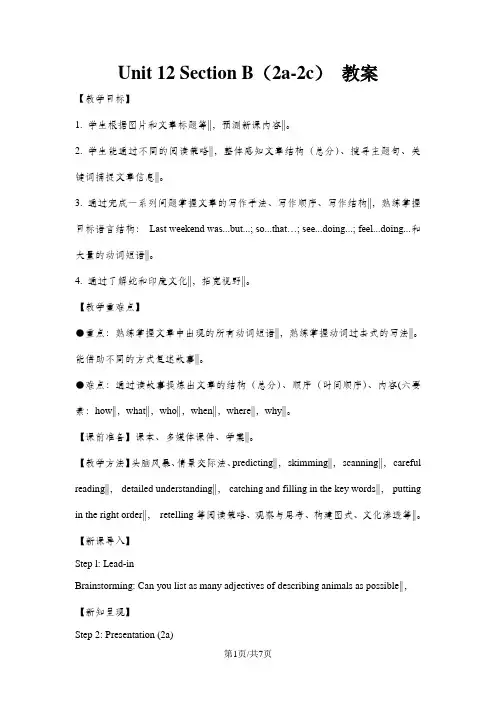
Unit 12 Section B(2a-2c)教案【教学目标】1. 学生根据图片和文章标题等||,预测新课内容||。
2. 学生能通过不同的阅读策略||,整体感知文章结构(总分)、搜寻主题句、关键词捕捉文章信息||。
3. 通过完成一系列问题掌握文章的写作手法、写作顺序、写作结构||,熟练掌握目标语言结构:Last weekend was...but...; so...that…; see...doing...; feel...doing...和大量的动词短语||。
4. 通过了解蛇和印度文化||,拓宽视野||。
【教学重难点】●重点:熟练掌握文章中出现的所有动词短语||,熟练掌握动词过去式的写法||。
能借助不同的方式复述故事||。
●难点:通过读故事提炼出文章的结构(总分)、顺序(时间顺序)、内容(六要素:how||,what||,who||,when||,where||,why||。
【课前准备】课本、多媒体课件、学案||。
【教学方法】头脑风暴、情景交际法、predicting||,skimming||,scanning||,careful reading||,detailed understanding||,catching and filling in the key words||,putting in the right order||,retelling等阅读策略、观察与思考、构建图式、文化渗透等||。
【新课导入】Step l: Lead-inBrainstorming: Can you list as many adjectives of describing animals as possible||,【新知呈现】Step 2: Presentation (2a)1. Brainstorming: Can you list animals we have learned? What kinds of animals are you sometimes afraid of? (Put a for being afraid of) Why?Animals Be afraid of Why2. Work in groups. Exchange your ideas with your group members.3. Ask several students to share their ideas in front of whole class.(设计意图:通过brainstorming复习动物词汇||,通过询问学生What kinds of animals are you sometimes afraid of? Why? 引出交际的内容||,激活与文章有关的背景知识||,鼓励学生发表个人看法||,在最短的时间里融入英语课堂||。
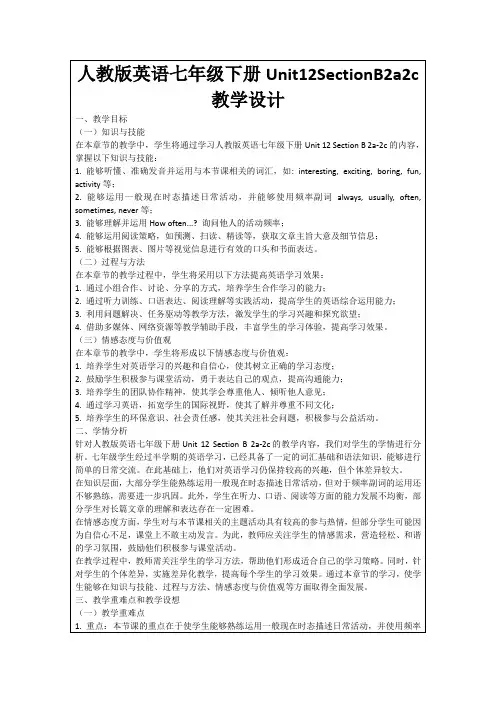
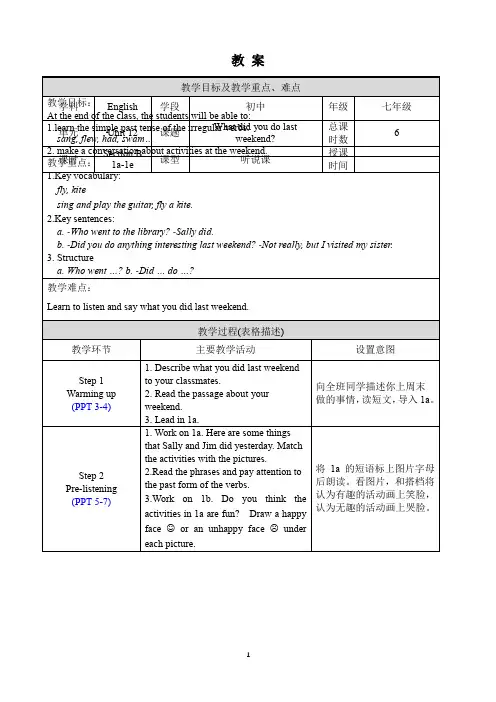
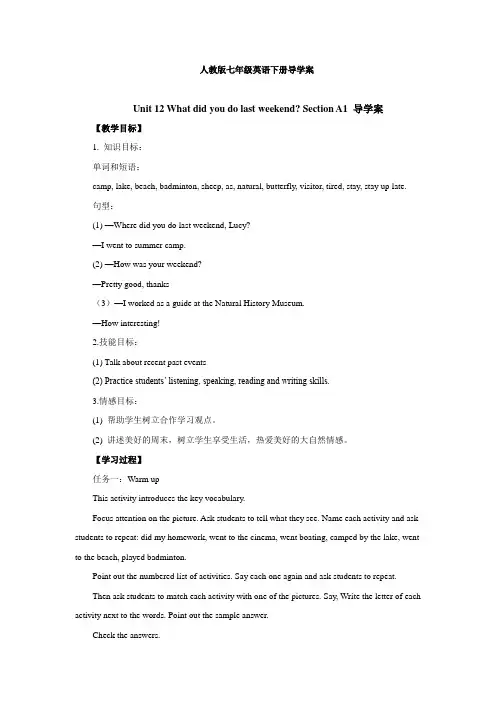
人教版七年级英语下册导学案Unit 12 What did you do last weekend? Section A1 导学案【教学目标】1. 知识目标:单词和短语:camp, lake, beach, badminton, sheep, as, natural, butterfly, visitor, tired, stay, stay up late.句型:(1) —Where did you do last weekend, Lucy?—I went to summer camp.(2) —How was your weekend?—Pretty good, thanks(3)—I worked as a guide at the Natural History Museum.—How interesting!2.技能目标:(1) Talk about recent past events(2) Practice students’ listening, speaking, reading and writing skills.3.情感目标:(1) 帮助学生树立合作学习观点。
(2) 讲述美好的周末,树立学生享受生活,热爱美好的大自然情感。
【学习过程】任务一:Warm upThis activity introduces the key vocabulary.Focus attention on the picture. Ask students to tell what they see. Name each activity and ask students to repeat: did my homework, went to the cinema, went boating, camped by the lake, went to the beach, played badminton.Point out the numbered list of activities. Say each one again and ask students to repeat.Then ask students to match each activity with one of the pictures. Say, Write the letter of each activity next to the words. Point out the sample answer.Check the answers.任务二:ListeningWork on 1bThis activity gives students practice in understanding the target language in spoken conversation.Point to the activities in the picture in activity la. Ask students to tell what the person did in each picture. For example, She played badminton, or Lucy went to the cinema. Play the recording the first time. Students only listen.Play the recording a second time. This time say. Listen to the recording and write the days and times Lucy did each thing under the pictures. Point out the sample answer under the picture of Lucy playing badminton; on Saturday morning.Correct the answers.任务三:Pair workWork on 1cThis activity provides guided oral practice using the target language.Point to the example conversation. Ask two students to read the dialogue to the class.Say, Now work with a partner. Student A, pretend to be Lucy. Student B, ask questions about what Lucy did on different days and times over the weekend. Talk about the activities in the picture.Students work in pairs. As they talk, move around the room monitoring their work. Offer language or pronunciation support as needed任务四:ListeningWork on 2a:This activity gives students practice in understanding the key vocabulary in spoken conversation.Point to the five sentences and ask a student to read these sentences to the class.You will hear recording of a conversation. The people will talk about some of the activities and people, but they will not talk about others. Please underline the words you hear on the recording.Play the recording the first time. Students only listen.Play the recording a second time. This time, ask students to underline each word that is saidon the tape. Point out the sample answer, grandmother.Correct the answers.1grandma 2 homework 3 English 4 farm 5 cows任务五:ListeningWork on 2b:This activity provides listening practice using the target language.Call attention to the pictures of Carol, Becky, and Jack and ask students to identify each person by name.Now I will play the recording again. Listen to the students talking about what they did over the weekend. Write C for Carol, B for B Becky or J for Jack next to each statement in activity 2a. The first one has been done for you.Play the recording the first time. Students only listen.Point out the sample answer, S, in statement 1. Say, Sonia visited her grandmother.Play the recording again. Ask students to write a letter in front of each statement to show what each person did.Check the answers. B B C J J任务六:Pair workAsk and answer in pairs.Point to the example conversation. Ask two students to read the dialogue to the class.Say, Now work with a partner. Student A, ask questions about what, who or where, Student B answers. Students work in pairs.任务七:Roleplay the conversation.1. Ask Ss to look at conversation in 2d. Then Ss read the dialogue by themselves and find the answer to these questions:(1) What did Lisa do on her weekend?(2) What did Paul do on his weekend?2. Ss work in pairs and roleplay the conversations.3. Have several pairs perform their conversations for the rest of the class.Unit 12 What did you do last weekend? Section A2 导学案【教学目标】1. 知识目标:单词和短语:away, mouse, baby, shout, woof, language,run away, shout at, last weekend, go boating, last weekend句型:(1)What did you do last weekend?(2)I did my homework.(3)Who visited her grandma?(4)Where did she go last weekend?(5)She went to a farm.(6)Who did she go with?(7)She went with her classmates.2.技能目标:(1)Talk about recent past events(2)Practice students’ listening, speaking, reading and writing skills.3.情感目标:(1)提高学生独立学习能力。

Unit 12 What did you do last weekend?1.掌握本单元出现的表示周末活动的重点短语。
2.能正确使用一般过去时,学会使用助动词did及不规则动词的过去式谈论自己上周末的活动。
3.能正确运用一般过去时写一篇自己上周末活动的短文。
4.了解国外学生的周末活动,能合理有效安排自己的周末活动。
通过听力入手,符合学生的认知,再通过说和讨论等活动使学生逐步了解一般过去时的用法,通过阅读和写作进一步巩固所学语言,使学生能正确运用一般过去时谈论上周末的活动。
教学突破:联系实际,创设语境,通过听说活动反复训练谈论自己上周末的活动;在阅读中培养学生捕捉关键信息的能力;并通过写作训练引导学生学会合理地安排自己的周末活动。
注意方法与价值观的培养:以听说带动本单元的话题,在真实的语境中感知本单元的词汇和句型,培养学生良好的沟通能力。
归纳总结一般过去时的用法及一些不规则动词的过去式,培养学生自主学习的能力。
通过循序渐进的写作训练,写出自己上周末的活动安排,培养学生自我管理的意识。
第一课时:Section A 1a-1c第二课时:Section A 2a-3c第三课时:Section B 1a-2c第四课时:Section B 3a - Self Check蛇与印度中国敬“龙”,泰国敬“象”,印度则敬“蛇”!在印度,蛇类在文化中扮演重要的角色。
印度人崇拜蛇,视蛇为“神”的化身,而眼镜蛇尤受崇敬,被称为“努拉盘布”,即“善蛇”。
在印度文明和社会发展的进程中,佛教、印度教和耆那教始终是该国的三大宗教,对现代印度的社会信仰及意识形态的形成起着十分重要的作用。
有趣的是,这些宗教的许多神像中都有着一个共同的元素——蛇。
由此可见蛇在印度人民心目中的地位和在社会文化生活中所扮演的角色。
印度有蛇庙、蛇村、蛇舞、蛇船赛,每年还专门设有全国性的蛇节来敬蛇神。
祭拜蛇神是印度传统的宗教仪式,许多印度教徒会在蛇节那天给蛇神献上鸡蛋和牛奶作为供品。
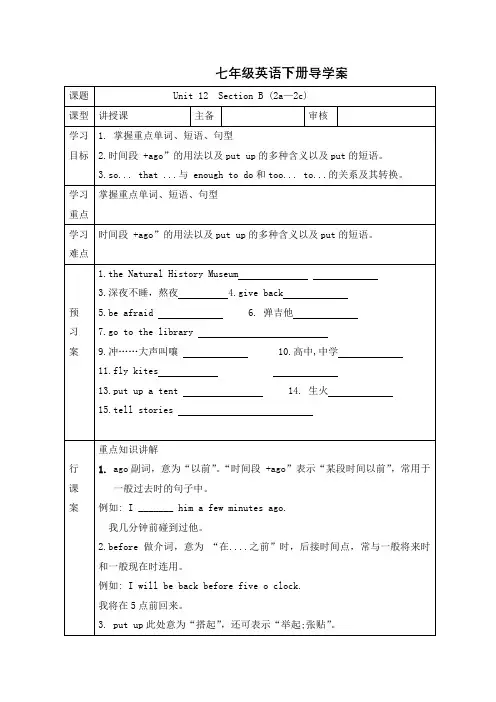
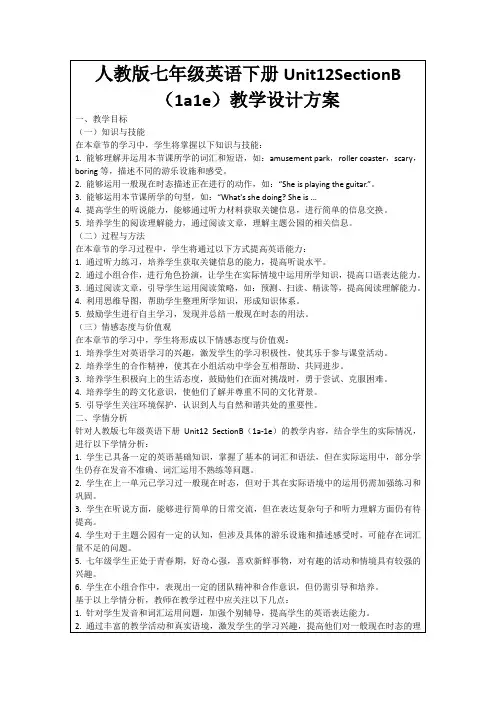
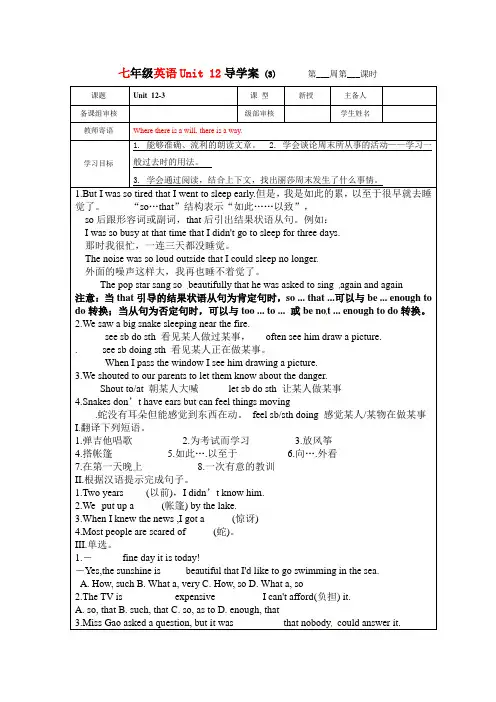
七年级英语Unit 12导学案 (3) 第___周第___课时课题Unit 12-3课型新授主备人备课组审核级部审核学生姓名教师寄语Where there is a will, there is a way.学习目标1. 能够准确、流利的朗读文章。
2. 学会谈论周末所从事的活动——学习一般过去时的用法。
3. 学会通过阅读,结合上下文,找出丽莎周末发生了什么事情。
1.But I was so tired that I went to sleep early.但是,我是如此的累,以至于很早就去睡觉了。
“so…that”结构表示“如此……以致”,so后跟形容词或副词,that后引出结果状语从句。
例如:I was so busy at that time that I didn't go to sleep for three days.那时我很忙,一连三天都没睡觉。
The noise was so loud outside that I could sleep no longer.外面的噪声这样大,我再也睡不着觉了。
The pop star sang so beautifully that he was asked to sing again and again注意:当that引导的结果状语从句为肯定句时,so ... that ...可以与be ... enough to do转换;当从句为否定句时,可以与too ... to ... 或be not ... enough to do转换。
2.We saw a big snake sleeping near the fire.see sb do sth 看见某人做过某事,often see him draw a picture.. see sb doing sth 看见某人正在做某事。
When I pass the window I see him drawing a picture.3.We shouted to our parents to let them know about the danger.Shout to/at 朝某人大喊let sb do sth 让某人做某事4.Snakes don’t have ears but can feel things moving.蛇没有耳朵但能感觉到东西在动。
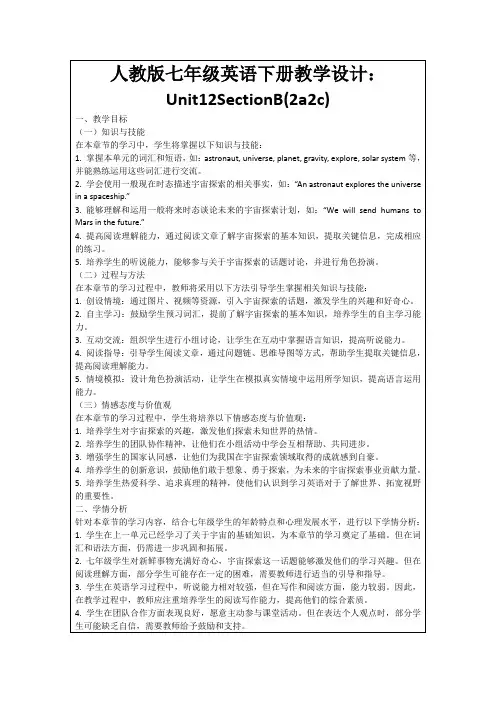
七年级英语下册 Unit12 Don’t eat in class导学案(无答案)人教新目标版Unit 12 Don’t eat in class. Section A(1a-2c) 课时1班级:姓名:学号:【学习目标】一、New words: rule; hallway; classroom; fight; outside; dining hall; Ms;二、Target language: 1. Don’t arrive late for class. 2. Don’t run in the hallway.3. Don’t eat in the classroom.4. Don’t listen to music in the classroom or the hallway.5. Don’t fight.三、学习祈使句的用法。
【预习内容】一、预习1a和2a,词汇翻译。
1.在课堂上吃东西2.上学迟到3.在走廊上跑4.在外面听音乐5.在餐厅里6.戴帽子二、根据首字母或汉语提示写单词。
1. There are many r in my family.2.We can’t run after others in the (走廊).3.Jim, don’t (打架)with your classmates.4. It’s snowing now. Don’t go (外面).5. All the students are sitting in the c , listening to the teacher.三、通过预习你的疑问是【课堂探究】一、Play a small game: Here are some rules that you can’t break.1. Do n’t laugh in class.2. Don’t close your eyes.3. Don’t talk to me. (Punishment: If someone breaks one of the rules, he/she has to do something.) 二、Learn the rules in 1a, read the rules. Then write the number of the rule nextto the student.三、Listening tasks: 1.Listen and write the numbers after the names.2. Listen and check the activities Alex and Cindy talk about.3. Listen and circle “can” or “can’t”.四、Pair work: Talk about the rules at your school. Then write them down.五、Main points: (知识探究)1. arrive late for= be late for 做某事迟到。
2019-2020学年人教版英语七年级下册英语教学案执笔审核课型听说课课时1授课人授课时间姓名学案编号【课题】Unit12what did you do last weekend?Section A(1a-1c)教师复备或学生笔记栏【学习目标】【学习重点难点】【学法指导】【教学过程】1.学习并掌握词汇:camp, lake, beach,badminton,sheep2.学习目标语言:What did you do last weekend? Well,……3.情感态度目标:通过描述过去的事情,使学生学会尊重和理解别人,学会了解他人的喜好,增进情谊。
熟练拼写和运用等词。
对过去的事情进行询问。
预习自学导学解疑巩固一、导入(启发探究3分钟)I、预习交流1.根据单元标题和图片等,预测新课内容;2.根据音标拼读单词并牢记;3.自学课文,勾画出重点和疑惑。
II、翻译官1.做作业_______________2.去海滩________________3.go boating___________4.打羽毛球_________________5.去电影院___________ 6.camp by the lake____________二、自学(自主探究6分钟)1.预习课文,朗读理解记忆词汇2.你能通过预习说出下面的句子吗?并试着写下来。
——谁去拜访了她的奶奶?——是贝姬。
--Who______her grandma?--Becky______.三、交流(合作探究10分钟)【课堂导学】:I、新课呈现Step1 Review&Lead-inAsk several students one by one: What did you do last weekend?Step2 Presentation1. Learn the phrases in1a.2. Finish1a, then check the answers.3.Look at the conversation,and learn the drills:--What did you do last weekend?--Well,on Saturday morning,I played badminton.Step3 ListeningListen and finish 1b.Check the answers.Step4 Pair workPractice the conversation in1c.Then make your ownconversations.四、总结(引四、总结(引申探究15分钟)一、动词过去式的构成:Group work:尝试用一般过去时造句+ 表过去的时间状语。
Unit 12 What did you do last weekend?Period 1Section A(1a~2d)自主学习课前诊断温故知新Ⅰ。
Dialogue:A: What do you usually do on weekends?B: I usually …Ⅱ. 汉译英1. 去看电影______________2. 去划船_______________3. 去海滩________________4. 去湖边野营___________5. 打羽毛球______________6. 去农场_______________7. 喂一些羊______________ 8. 看望我的祖母_________9. 为数学考试而学习________ 10. 在星期日晚上_________二.设问导读Ⅰ. Talk about what you did last weekend. Match the activities with the pictures (1a). Ⅱ. Listening (1b).Ⅲ. Role-play (1c).A: What did you do last weekend?B: On Saturday morning I played badminton.Ⅳ. Listening (2a, 2b).自我检测根据汉语意思完成句子,每空一词1. 你的周末怎么样?______ was your ______?2. 昨天我和我的同学去湖边野营。
I ______ ______ the lake with my _______ _______.3. 我去了农场并且喂了一些牛。
I went to a ______, and I ____some _____.4. 我呆在家,为英语考试而学习。
I _____ at home and _____ _____the English _____.互动学习问题解决辨析: bring, take, carry, fetchbring 意为“_____________”,表示“拿到靠说话人近的地方”。
七年级英语 学科导学案、前置性作业st weekend 意为 上周末”,当表示时间的名词前有last, this 等修饰时,前面通常不加介词, 并且常用于一般过去时的句子中。
2.Who visited her grandma ?这是一个特殊疑问句,由疑问代词 who 作句子的主语时, 要视为单数主T H 'eg: --Who is coming tomorrow? --Lucy.— *皿^三、知识反馈I 、写出下列动词的过去式 1. camp2.work3. feed4. play __________ ___5.stay____ ___6. study __________________7. tell8. lose9. hear 10. run 11.shout 12. answer 13.sing 14.swim 15.drink 16.begin 17.fly 18.draw 19.know 20.grow21.throw四、当堂检测1.用括号内所给单词的适当形式填空。
1. Did Carol(camp) with us?2. Lets go (boat) next.1.做作.业 ____________________ 4. go boating ____________________ 3.去电影院 ___________________ 7.visit my grandma 9. work as a guide 11. How interesting!13. kind of ______________________二、知识点拨2.去海滩 _______________________ 5 .打羽毛球 ____________ __________ 6 . camp by the lake8.备考 ____________________ 10. over _____________________ 12. living habit ______________ 14.熬夜 __________________3.We like playing(beach) volleyball.4.They(play) badminton yesterday morning.5.I (not hear) from her last week.2.根据句意及首字母提示填空1.Don ' t c under the tree. It ' s not safe.2.The children like swimming in the l.3.The Super Dan is a great b player.4.Did you go to the b yesterday?5.I like -playing games o Sunday morning.3.单项选择( )1. -- Did you have a at school last week?-- Yes、we did. I got an A.A. testB. lookC. walk( )2. -- How long did Helen in Changsha? -- For a week.A. sitB. stayC. feel( )3. Lucy- go to the movies. She watched TV at home.A. isn'tB. didn'tC. wasn't( )3. He had to go「there.A. campB. campsC. Camping( )4. They are having fun the beach. A. on B. in C. atW根据汉语完成句子。
Section B第5课时(3a~3b)原创不容易,为有更多动力,请【关注、关注、关注】,谢谢!师者,所以传道,授业,解惑也。
韩愈类别学习重点重点短语stay at home, cook dinner, school trip, fire station重点句式1. I had a busy weekend.2. I had a school trip last week.课前预习译一译 1.待在家里stay at home 2.做饭cook dinner 背一背我有一个忙碌的周末。
I had a busy weekend.新课导入Teacher:What did you do last weekend? Did you have a busy weekend? Let’s complete the passage in 3a.Then write a passage about what you did last weekend.新课展示【完成教材3a~3b的教学任务】1.学生认真阅读短文,根据图片提供的信息完成短文填空。
完成后师生集体核对答案。
同时要熟读短文。
2.学生根据自己的实际情况写一篇短文来介绍自己上个周末的活动。
写完后小组内交流,教师抽查讲评。
3.学生练习写作。
典例参考:My Last WeekendIhad a busy weekend.On Saturday morning. I walked to Lily’s home. I studied English with her. In the afternoon, I cooked noodles with my mother. On Sunday morning, I washed my clothes and cleaned my room. In the afternoon I went to a park by bike. I flew kites there. It was a sunny day. In the evening, I watched TV. It was fun. My last wekend was very busy. But I was very happy.活学活练(A)1.What did you do Sunday morning?A. onB. atC. inD. for布置作业:教师引导学生课后完成本课时对应练习,并预习下一课时内容。
课题:Unit12 What did you do last weekend? Section B (2a—2c)
一、学习目标:
1. 能够准确、流利的朗读文章。
2. 通过阅读,学会结合上下文,理清Lisa周末发生了什么事情。
3. 学会谈论周末所从事的活动——学习一般过去时的用法。
二、重、难点:掌握重点词汇、短语以及阅读技巧。
学习过程:
Step 1:Reading aloud
1、阅读文章标题,仔细观察右边图片,这篇文章写的是
2、大声自由朗读课文,注意单词发音和句子停顿问题。
3、小组内轮流朗读课文,互相纠错,互相评价。
Step 2:While Reading
默读文章,完成下列问题。
(1题完成句子,2-3题简略回答,4题找出文章主旨句,5题翻译文中句子)
1)Our parents took my sister and me to India, because my sister finished high school .
2)Where did Lisa and her family go last weekend?
3)How did Lisa feel when she saw the snake?
4)
5)翻译“This was a very useful lesson for me. ”
Step 3: Reading Again
1、品读文章,小组合作快速翻译文章,并完成下列问题。
1)My sister finished high school two weeks ago.
2)We took a long bus ride to a lake in the countryside.
3)Snakes don’t have ears but can feel things moving.
4)他也告诉我们不要靠近一条蛇是很重要的。
2、根据文章发展情况完成排序,小组合作试着复述课文。
( ) snake went into the forest.
( ) put up our tents and cooked food
( ) learned a useful lesson
( ) saw a snake and shouted to parents for help. ( ) snakes can’t hear but can feel things moving. ( ) my dad jumped up and down in his tents.
( ) took a bus to a small village in India
( ) told stories under the moon,then went to sleep.。